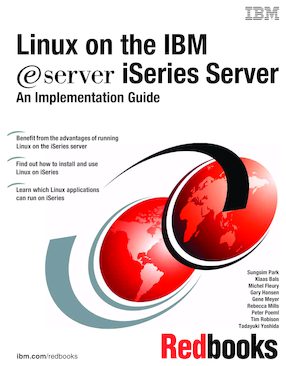Linux on the IBM eServer iSeries Server: An Implementation Guide
An IBM Redbooks publication
Note: This is publication is now archived. For reference only.

Published on 30 January 2002, updated 03 July 2002
ISBN-10: 0738423750
ISBN-13: 9780738423753
IBM Form #: SG24-6232-00
Authors: Sungsim Park, Klaas Bals, Michel Fleury, Gary Hansen, Gene Meyer, Rebecca Mills, Peter Poeml, Tim Robinson and Tadayuki Yoshida
Running Linux on the IBM eServer iSeries server combines the strengths of Linux and OS/400 for an integrated solution. Linux delivers excellent open source solutions, while OS/400 is a premier integrated platform for business solutions. Linux enables a new stream of e-business applications for the iSeries platform that complements its strength as an integrated core business solution. Linux applications benefit from the iSeries platform’s ability to provide resource flexibility, security, reliability, and connectivity to other applications on a single server.
This IBM Redbooks publication begins with an overview of Linux, defines what open source means, and explains why using Linux on iSeries is beneficial. Then, it highlights how to install and use Linux on the iSeries server. It discusses the basic system administration tasks and Linux application development to help you manage your system and develop Linux applications on the iSeries server. It also introduces a wide range of services, such as Firewall, Apache, Samba, and e-mail, and explains the capabilities of each.
This book is intended to help beginner and intermediate Linux users, with an OS/400 background, to implement Linux on the iSeries server.
Chapter 1. Getting acquainted with Linux on the iSeries server
Chapter 2. Installation and operation of Linux on the iSeries server
Chapter 3. Linux administration
Chapter 4. Advanced administration and development
Chapter 5. X Windows and OpenOffice
Chapter 6. Apache HTTP server on Linux
Chapter 7. The Tomcat Web Application Server (using Java) on Linux
Chapter 8. Firewall on iSeries Linux
Chapter 9. ssh and Telnet
Chapter 10. FTP servers on Linux
Chapter 11. Samba
Chapter 12. Network File System
Chapter 13. Linux print support
Chapter 14. E-mail systems on Linux
Chapter 15. System time (NTP) and job scheduling (cron and at)
Chapter 16. Help information
Appendix A. Application scenarios
Appendix B. ODBC
Appendix C. Hardware planning, ordering, and configuration examples